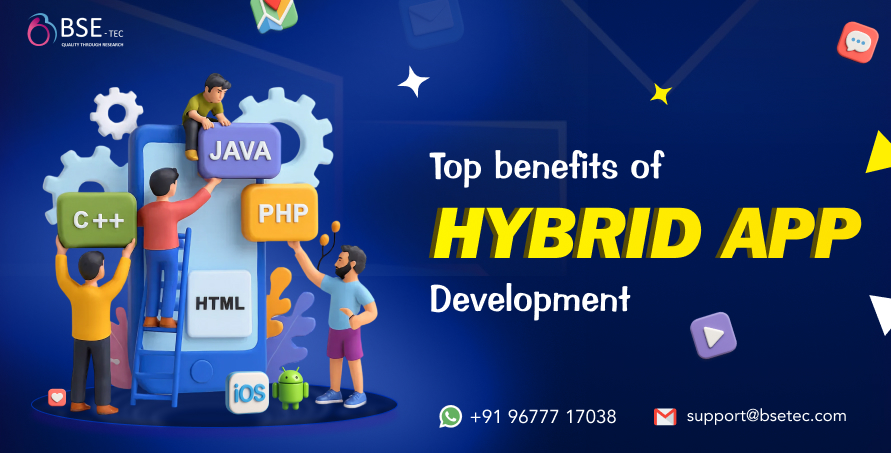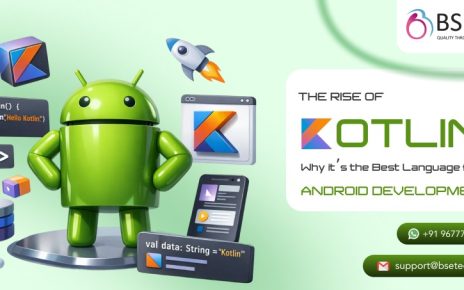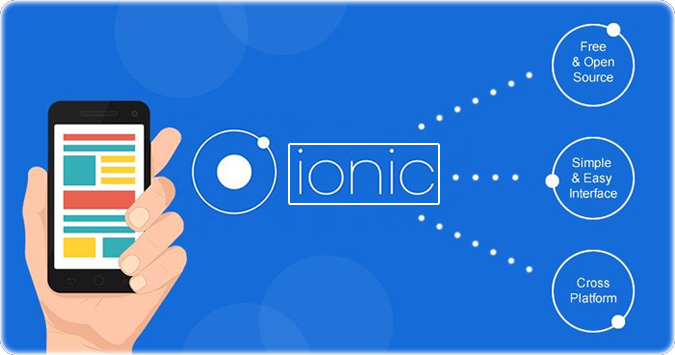
Mobile applications are vital components of the modern world. We rely increasingly on mobile devices because we live in an internet age. A mobile app is necessary for everything to function, including ordering food and scheduling a homestay.
With the features of iOS and Android, mobile devices are becoming increasingly popular. In addition to these characteristics, there is a third, referred to as the hybrid app, that supports and operates on several platforms, including iOS and Android.
In this blog, we will examine hybrid app development and its benefits.
What is hybrid app development?
Hybrid app development is the process of producing a single mobile application that runs on both Android and iOS, utilising a common codebase. Instead of creating distinct apps for each platform, developers create a single app using web technologies such as HTML, CSS, and JavaScript, then utilise frameworks such as React Native, Flutter, or Ionic to make it run like a native app.
Let’s look at how it works, step by step
- Organise the App: Choose the features, design, and target platforms (iOS and Android) for the app.
- Select a Hybrid Structure: Depending on your requirements, choose a framework such as Xamarin, Flutter, Ionic, or React Native.
- Compose the Code: Create the application utilising web technologies such as JavaScript, HTML, and CSS. Both platforms will be served by this one codebase.
- Use a Native Container to Wrap: In order to make the web code mobile-friendly, the hybrid framework covers it in a native shell.
- Utilise the Features of the Device: To make the app feel like a native software, use the framework to enable capabilities like storage, GPS, camera, and push notifications.
- To guarantee seamless operation and usability, test the app on a variety of devices and screen sizes.
- Install in Stores: Using the same codebase, publish the app to the Apple App Store and Google Play Store.
- Updating and Maintaining: Once updates or problem fixes are made in the same codebase, they instantly appear on both platforms.
Where it is used
- Retail and e-commerce: Easy checkout, quick updates, and seamless shopping.
- Financial Services: Secure, quick banking and investing applications.
- Entertainment & Media: Top-notch social apps, games, and streaming.
- Travel & Hospitality: Easy ride-sharing and reservation processes.
- Education & Learning: Easy access to courses and online learning.
- Healthcare & Wellness: Real-time data for fitness apps and telemedicine.
Benefits of hybrid app development
Cost-Effective Development
Developing two separate native apps can be expensive, especially for startups and small organisations. Hybrid apps decrease expenses dramatically because one codebase supports both platforms. Less coding, fewer resources, and lower development time translate into huge savings.
Easy Maintenance and Updates
Maintaining two distinct apps can be tough and time-consuming. Hybrid apps simplify updates because changes made in the codebase automatically reflect on both platforms. This assures uniformity and decreases the possibility of bugs or mismatched features.
Quicker Time-to-Market
With hybrid development, firms may launch their apps faster. Since developers don’t need to maintain different versions for Android and iOS, the app can be designed, tested, and launched quickly. This is especially valuable for companies aiming to join the market before the competition.
Near-Native Efficiency
Apps can function nearly like native apps thanks to contemporary hybrid frameworks like Flutter and React Native. In terms of user experience, hybrid apps are identical to native ones thanks to their fluid animations, quick load times, and easy navigation.
Greater Reach of the Audience
A hybrid application functions on several platforms and devices. Without spending money on numerous native apps, businesses can reach a wider audience. For businesses aiming for international markets, where consumers may use various devices, this is essential.
Scalability for Upcoming Expansion
As business needs expand, hybrid apps are simple to scale. Hybrid apps offer a flexible and adaptable base for expanding to new platforms, connecting APIs, or adding new features.
Why choose BSEtec for Hybrid app development?
Selecting BSEtec entails working with a group that creates high-performance hybrid apps by combining strong technical know-how, cross-platform competence, and user-focused design.
Using a single, optimised codebase, we provide scalable, future-ready mobile solutions that function flawlessly on both iOS and Android. BSEtec guarantees quick development, low prices, and native-like performance with its extensive experience with frameworks like Ionic, Cordova, and Xamarin.
Each app is dependable and feature-rich because of our emphasis on clear UI/UX, safe API integration, offline capabilities, and custom plugin development. BSEtec offers end-to-end support, from development to testing, upgrades, and long-term maintenance, whether you require an e-commerce app, business tool, or promotional platform.
In conclusion
For companies looking for greater reach with less complexity, hybrid app development offers the optimal blend of speed, cost-effectiveness, and cross-platform performance.
With BSEtec’s proficiency in UI/UX, secure integrations, end-to-end support, and current frameworks, you can create a scalable, high-quality hybrid software that functions flawlessly on both iOS and Android.
Ready to build your hybrid app? Get in touch with us!

